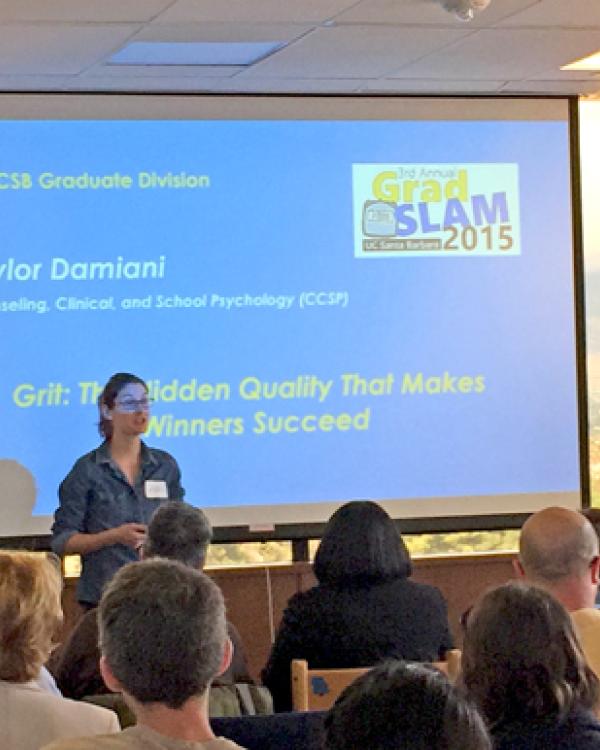
Graduate students and faculty gathered on the 8th floor in Davidson Library Pacific View Room for UCSB’s Grad Slam 2015 Prelimary Round 4 on Thursday, April 7th. For the first time, the Grad Slam Competition held a people’s choice award along with an award from a panel of four judges. Each member of the audience was handed a ballot as they entered so they could vote for their favorite contestant at the end of the Grad Slam. Both judges and audiences were told to look for factors such as appropriateness for a nonspecialist audience; clear and compelling presentation; intellectual significance of research; and intellectual engagement and curiosity in the talk. In this round, three graduate students from GGSE along with six other graduate students in different UCSB departments competed for an invite to the semifinal round.
Each GGSE contestant shared their research on education and learning styles with an oral presentation and a PowerPoint slide. Three minutes, that’s all the time each graduate student had to win over both judges and the audience. A ticking timer controlled the fate of the contestants. If the timer went past three minutes, the judges deducted points. Luckily, no one in this round went past the three minute mark.
Taylor Damiani, a student in the Department of Counseling, Clinical, and School Psychology, was the second graduate student at the Grad Slam to present her research. Damiani gave the talk “Are Givers Grittier: Reciprocity Style & Grit” and shared the importance of grit for students and teachers. Diamini began her talk with an experience during her first years of teaching in her effort to learn how to be a better teacher that led to her research. “As I watched the best teachers, I learned they had a whatever-it-takes mentality. They worked the longest and the hardest and would also go the extra mile to help their kids. They had grit.” She wondered if grit could be learned in the classroom and asked: “What makes people gritty and how does one intentionally cultivate grit?”
Damiani looked at character traits of givers and takers in researching grit and found self-interest rather than other-interest is related to grit because of its correlation to higher gratification. “Research on grit develops interventions that can inform people on their potential not only in classrooms, but also in the workplace, in relationships, and in ourselves,” Damini concluded. Diamini’s further research on grit will be important for developing student behavior and learning both in and out of the classroom.
Speaking of student development, Ken Sterling, a Ph.D. candidate in the Department of Education, presented a learning style that can better improve overall student learning within the classroom. To do that he first showcased what’s wrong with current high stakes multiple choice test taking in his talk, “Imagine a Reality TV Show with a Boss Handing a Scantron Form to an Employee.” Although no country uses high stakes multiple choice test taking more than the United States, Sterling said research shows that “Twenty percent of students suffer from high test anxiety while another twenty percent suffer moderate test anxiety.” The problem with multiple choice test taking is that it not only gives students feelings of anxiety, helplessness, and failure, but it also places students into the three categories of low, average, and high performers. Sterling provided the alternative of project group learning style that is more congruent to real world and hands-on practices. Project-based group learning allows students to work in groups to teach each other and apply techniques of inclusion, diversity, and collaboration realistic to the work force.
Cameron Sublett, student in the Department of Education, closed out the Grad Slam with the talk “Does Community College Online Course Enrollment Impair Student Success?” Over the past decade, nearly a third of community college students take at least one full online course having never met their instructor. Forty percent of college students today are enrolled in community colleges; many of these students are low income, academically unprepared, first generation, but most importantly highly aspirational students. Sublett prompted the audience to think about whether online courses are best serving these students. “Researchers and policy makers are asking: do online courses impede student success?” Sublett stated. “The truth is we just don’t know.” As Sublett reviewed previous studies, he found results have been mixed with many of the studies suffering from the same flaws that focused on individual levels and single regressions. “We need a better study, we need my study,” Sublett stated. Sublett’s study not only uses a nationally represented data set, but also uses variables at individual, institutional, and district levels. His study looks at a multilevel logistic regression that can create equivalent group comparisons of online test taking. By creating a better study that looks at the effects of online courses on student learning using a multilevel analysis, Sublett is working towards proving the effects of online course enrollment on student learning.
At the end of the Grad Slam presentation, graduate students lined up in the front of the room for a Q&A session with the audience. Once questions were answered, the contestants waited patiently outside for the results while both the audience and judges casted their votes.
GGSE’s Ken Sterling was chosen for the People’s Choice Award and rewarded with a $50 UCSB bookstore gift card. The two other winners were Jessica Perkins, from the Bren School of Environmental Science and Management, and Celeste Pielgard, from the Department of Psychology and Brain Sciences. All three will move onto the semifinal showdown, hoping to move on to the final round to compete for the grand prize of $5,000. For the first time this year, the UCSB grand prize winner will also advance to a UC-wide competition on May 4 to compete for the top prize of an additional $5,000.
“It is an honor to be recognized among an amazing group of peers,” Ken Sterling states.